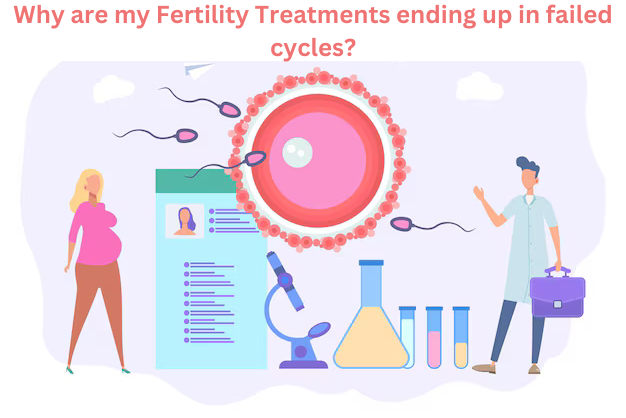Why are my Fertility Treatments ending up in failed cycles?
It can be incredibly frustrating and disheartening when fertility treatments end in failed cycles. If you're experiencing this, you're not alone. Many couples go through multiple failed cycles before achieving a successful pregnancy.
There are a number of reasons why fertility treatments might fail. Some of the most common include:
Poor egg quality: As women age, their egg quality declines. This can make it more difficult to fertilize eggs and create healthy embryos.
Uterine problems: Problems with the uterus, such as uterine fibroids or polyps, can make it difficult for an embryo to implant and develop.
Endometriosis: Endometriosis is a condition in which tissue similar to the lining of the uterus grows outside of the uterus. This can cause infertility by damaging the fallopian tubes and ovaries.
Male factor infertility: Male factor infertility is a common cause of infertility. It can be caused by a variety of factors, such as low sperm count, poor sperm quality, or obstructions in the reproductive tract.
Embryo quality: Even if an egg is fertilized, the resulting embryo may not be of good quality. This can make it less likely for the embryo to implant and develop.
Stress: Stress can have a negative impact on fertility. This is because stress can disrupt the hormones that regulate ovulation and pregnancy.
If you're experiencing failed fertility cycles, it's important to talk to your doctor about the possible causes and discuss treatment options. There are a number of things that can be done to improve your chances of success, such as:
Improving egg quality: If your egg quality is poor, your doctor may recommend taking supplements or undergoing hormone therapy.
Treating uterine problems: If you have uterine problems, your doctor may recommend surgery to remove fibroids or polyps.
Treating endometriosis: If you have endometriosis, your doctor may recommend surgery or medication to treat the condition.
Treating male factor infertility: If male factor infertility is the cause of your infertility, your doctor may recommend treatment such as medication, surgery, or artificial insemination.
Improving embryo quality: If your embryo quality is poor, your doctor may recommend preimplantation genetic testing (PGT). This test can help to identify embryos with genetic abnormalities.
Managing stress: If stress is a factor in your infertility, your doctor may recommend stress management techniques such as relaxation exercises or counseling.
It's important to remember that there is no guarantee of success with fertility treatments. However, by understanding the possible causes of failed cycles and working with your doctor, you can improve your chances of achieving a successful pregnancy.
Here are some additional tips for coping with failed fertility cycles:
Don't give up: It takes time and patience to achieve a successful pregnancy. Don't get discouraged if you experience a few failed cycles.
Talk to other couples who have been through infertility: Talking to other couples who have experienced infertility can be helpful. They can offer support and advice.
Find a support group: There are many support groups available for couples who are struggling with infertility. These groups can provide a safe and supportive environment to share your experiences.
Take care of yourself: It's important to take care of yourself both physically and emotionally during this time. Make sure to get enough sleep, eat healthy foods, and exercise regularly.
Find healthy ways to cope with stress: Stress can make it more difficult to conceive. Find healthy ways to cope with stress, such as yoga, meditation, or spending time in nature.
Conclusion
If you're experiencing failed fertility cycles, it's important to talk to your doctor about the possible causes and discuss treatment options. There are a number of things that can be done to improve your chances of success. By understanding the possible causes of failed cycles and working with your doctor, you can improve your chances of achieving a successful pregnancy.
FAQs
1: What are the common reasons for failed fertility treatments?
Failed fertility treatments can result from various factors, including:
- Age and Ovarian Reserve: As women age, egg quality and quantity decline, affecting fertility.
- Underlying Health Conditions: Conditions like endometriosis or PCOS can impact ovulation and implantation.
- Lifestyle Factors: Poor diet, smoking, and excessive alcohol can negatively influence fertility.
- Hormonal Imbalances: Disorders affecting hormone levels can disrupt the ovulation process.
- Embryo and Sperm Quality: Poor-quality embryos or sperm can hinder fertilization and implantation.
- Immune System Issues: Certain immune conditions can affect embryo acceptance.
2: How does age affect my fertility treatment success?
Age significantly impacts fertility. Women over 35 may experience reduced egg quality and quantity, leading to lower success rates in treatments like IVF. It’s essential to assess ovarian reserve through specific tests if you are of advanced maternal age.
3: What role do underlying health conditions play in failed cycles?
Conditions like PCOS, endometriosis, or uterine abnormalities can disrupt ovulation, affect egg quality, and hinder implantation. A thorough evaluation can identify these conditions and guide appropriate treatment.
4: Can lifestyle choices affect my fertility treatments?
Absolutely! Lifestyle factors, such as smoking, alcohol consumption, and diet, can significantly impact both male and female fertility. Making healthier choices can enhance your chances of success in fertility treatments.
5: How can hormonal imbalances affect my fertility?
Hormonal imbalances can interfere with ovulation and menstrual cycles, leading to issues in conception. Hormonal evaluations can help diagnose and treat these imbalances to improve your fertility treatment outcomes.

 Oct-16-2024
Oct-16-2024